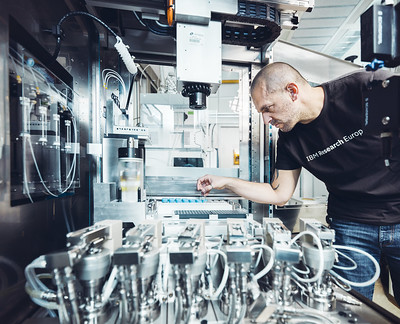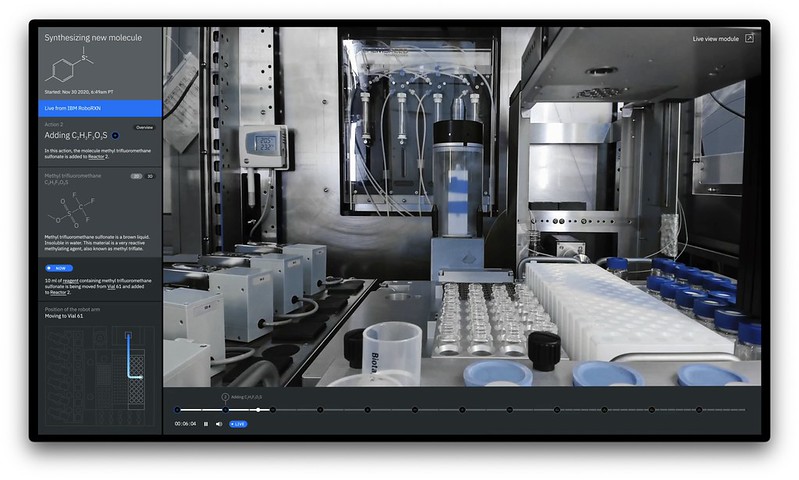Announcements
IBM Expands AI-Driven Materials Discovery Capabilities and Signs New Industry Collaborations
Zurich, Switzerland, November 24, 2021 --IBM (NYSE:IBM) today announced new enhancements to RoboRXN, a cloud-based, AI-automated lab that is designed to enable remote discovery and creation of new molecules and materials. Launched in 2018, RXN for Chemistry -- the AI behind RoboRXN -- has been used by more than 29,000 users and accumulated over five million reaction predictions in efforts to streamline the scientific process around discovery and creation of new materials.
While RoboRXN leverages cutting-edge cloud and AI capabilities to improve material discovery, it is essential this process be secure for organizations working with proprietary data. Additionally, there is a growing need to improve sustainability throughout manufacturing processes, including the chemical reactions that convert raw materials into finished products.
To address these challenges, IBM will now offer two new capabilities in RoboRXN:
- Security and customization: new cloud capabilities allow users to train RXN directly with sensitive datasets for more secure experimentation and customization of prediction models using proprietary knowledge.
- Greener chemical processes: new AI model scan now assist chemists in the rapid prediction and identification of more environmentally-friendly enzymes. Enzymes are highly complex bio molecules needed to convert materials into products such as paper, cosmetics, pharmaceuticals and flavors.
IBM is also announcing new collaborations with Atinary, Arctoris, Chemspeed Techonologies AG, Syngenta, and Thieme Chemistry to continue RoboRXN’s impact in accelerating the synthesis and testing of new materials across many industries.

Accelerating Materials Discovery
It can take nearly 10 years and upwards of $10-$100 million USD to identify and produce one new material. This is because synthetic chemistry still relies on trial and error methods, and little progress has been made to modernize the art of making materials.
“To create a new material today, researchers must voyage through a seemingly endless chemical space filled with more potential compounds than atoms in the universe,” said Dr. Alessandro Curioni, IBM Fellow and Director of IBM Research Europe. “To help solve many of the challenges that require new materials – from hunger to climate change to infectious diseases –researchers need to be able to ideate, synthesize and test potential materials effectively. Applying AI to this tremendous task through technologies such as RoboRXN holds the potential to help nearly every industry accelerate the effectiveness, sustainability and impact of the new materials they create.”
IBM RoboRXN is engineered to act as a navigator for chemists to discover and make materials in a more cost-efficient manner, compared to traditional processes,by automating a majority of the initial groundwork in materials synthesis. Users can also synthesize materials remotely via the cloud.
Discovering Greener Chemical Processes
RoboRXN now offers sustainable chemistry solutions that use machine learning to identify and rank effective and sustainable enzymatic processes, ultimately yielding greener chemical synthesis. For example, chemists can use this new AI architecture to leverage the enormous volumes of potentially known enzymes to replace traditional chemical catalysts and toxic solvents with natural compounds derived from plants and vegetables.
A main limitation for applying sustainable chemistry solutions is that the specific domain knowledge required to adapt existing enzymes to new chemical transformations is unstructured. This has made it difficult and time-intensive to uncover new potential enzymes via traditional experimentation methods.
Discovering enzymes for organic synthesis could enables implified, more economical, and sustainable routesto produce more environmentally-friendly products. Industrial use cases span from the food and beverage industry to pharma to cosmetics and more. In the production of paper, for example, pulp can be treated with xylanase, a naturally occurring enzyme, instead of bleach, which is expensive and polluting.

Expanding Industrial Applications
Each of IBM’s industry collaborators are testing RoboRXN in unique and customized ways, all with the goal to revolutionize the practice of organic chemistry and accelerate materials discovery. IBM is actively consulting and collaborating with each company, helping them integrate various technical features of RoboRXN in their workflows:
- Atinary Technologies and IBM launched a collaboration to integrate their two cloud platforms, Atinary Self-driving Platform (AtinaryTM SDLabs) and IBM RoboRXN, to accelerate and revolutionize chemical reaction optimization.
- Arctoris and IBM launched a research partnership to combineRXN for Chemistry with Ulysses, Arctoris’ automated biology and biochemistry platform thereby closing the Design-Make-Test-Analyse cycle in drug discovery.
- Chemspeed Technologies has formed a collaboration with IBM with the aim to offer IBM RoboRXN technology in conjunction with its automated synthesis solutions to its clients.
- Syngenta is implementing RXN technology into their materials discovery workflow.
- Thieme Chemistry and IBM have joined forces to improve synthesis planning by incorporating synthesis datasets from Thieme's expert human-curated digital publication sourceson organic chemistry –Science of Synthesis and Synfacts –into RXN for Chemistry. On December 1st, 2021,IBM Research and Thieme Chemistry will be holding a free web seminar, where the outcome of their collaborations will be outlined.
“The future of materials and chemistry is in the cloud, with the development and adoption of digital technologies for accelerating discovery, says Dr. Teodoro Laino, Distinguished Scientist at IBM Research Europe –Zurich.The cloud is the perfect infrastructure to encourage and stimulate cooperation among different technology providers and encourage the transition to digital solutions in everyday R&D operations. RoboRXN plays a strategic role as a forerunner of this new process of integration and development in chemical industry and research.”
RXN for Chemistry, the core engine of RoboRXN, is driven bya state-of-the-art neural machine learning translation method that predicts the most likely outcome of a chemical reaction. It does soby translating from one language (reactants and reagents) to another language (products) using sequences of characters called Simplified Molecular Input Line Entry System (SMILES) to describe chemical entities.
Optimised synthetic routes are then used as input for RoboRXN, an automated platform for molecule synthesis.The AI system is also equipped with an retrosynthetic architecture where instead of predicting the outcome of a possible chemical reaction (forward predictions), it works in reverse to first determine the chemicals needed to create a given target molecule.
This cloud-based AI platform was originally designed and launched in 2018 and made available for free on the IBM Cloud. Since its launch, RoboRXN has out performed all data-driven models, achieving more than 90 percent accuracy on forward chemical reaction predictions, and is currently being used by more than 29,000 users and has accumulated over 5 million reaction predictions. Today, it is being tested in workflows of some of the top pharma, biotech and agriculture companies, helping them to accelerate the predictions of chemical reactions, retrosynthesis pathways, experimental procedures as well as automating the compilation and execution of chemical syntheses.
About IBM Research
For more than seven decades, IBM Research has defined the future of information technology with more than 3,000 researchers in 16 locations across five continents. Scientists from IBM Research have produced six Nobel Laureates, 10 U.S. National Medals of Technology, five U.S. National Medals of Science, six Turing Awards, 19 inductees in the National Academy of Sciences and 20 inductees into the U.S. National Inventors Hall of Fame. For more information, please visit www.research.ibm.com/.
Press Contacts
Angela Harp
Media Relations
IBM Research Europe
Tel +41 44 724 83 91
amh@zurich.ibm.com
Sarah Benchaita
Media Relations
IBM Research
Tel +1 (281) 455-6432
sarah.benchaita@ibm.com